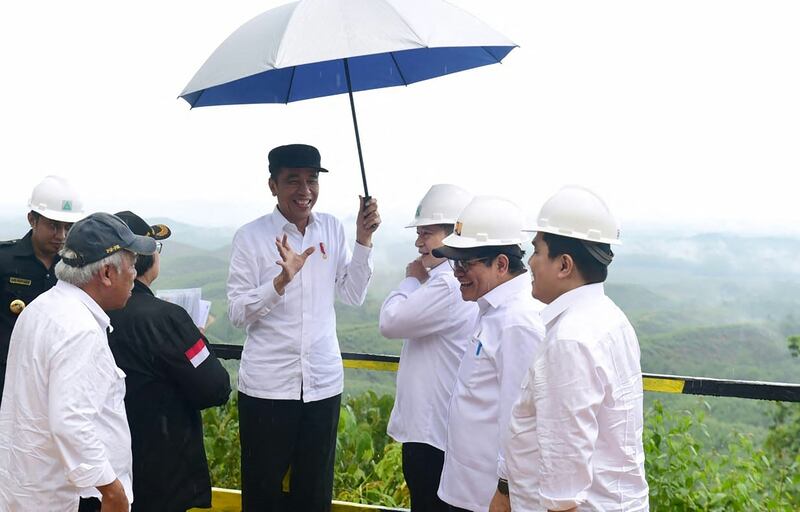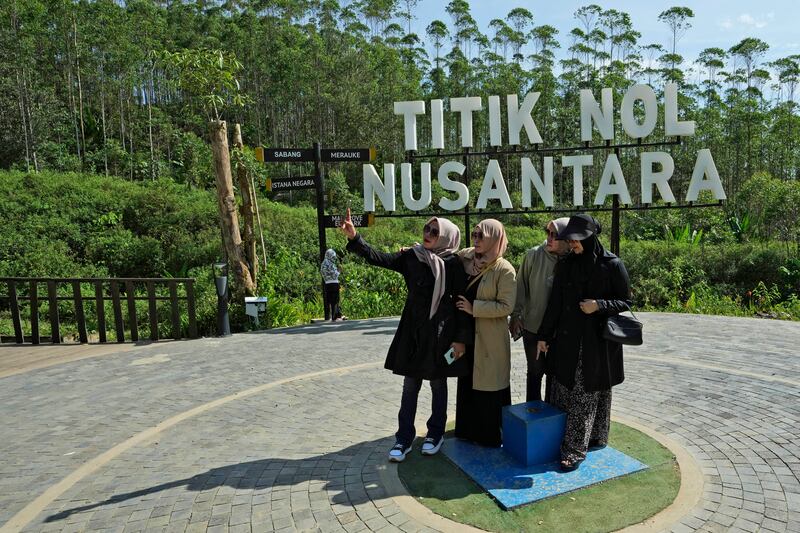Indonesia’s new capital project in Borneo has stirred controversy again, with civil society groups condemning authorities for “abuse of power” because they recently ordered dozens of families living on the site to demolish their homes in seven days.
For many, the new capital authority’s approach – issuing such orders with no prior notice and a very short window to comply – has revived memories of the New Order era under the late dictator Suharto, when communities were displaced for development purposes.
Last week, the capital authority notified about 200 families – including of indigenous people – that they had to raze their houses because the structures violated the area’s zoning plan. But Mareta Sari, a regional activist, said she suspected the urgency to meet a relocation deadline drove the hasty eviction process.
"We stand against the forceful displacement of local and indigenous communities from their lands," she told an online news conference on Tuesday from Samarinda, the capital of East Kalimantan,where the nation's new capital is being built.
She said the abrupt eviction notice served to the residents was an “abuse of power,” and a scare tactic, given the families’ longstanding presence in the area.
“These residents have established their lives here over many years. Why are they now being forced to leave? [And] If there are newcomers, why were they not informed earlier?” she said.
BenarNews obtained a copy of the notice, which had no date on it but was delivered to the families on March 4.
“[Y]ou are urged to promptly demolish your building, which does not comply with the provisions of the IKN Spatial Planning and the laws above and regulations, within a maximum period of 7 (seven) calendar days from the date of delivery of this First Warning,” read an excerpt from the notice printed in the Indonesian language.
President Joko “Jokowi” Widodo’s deadline for the first relocation to the new capital – 1,800 civil servants – is August, three months before he steps down from his position in October.
He hopes to leave office with this new planned green capital, called Nusantara, as
[ his legacyOpens in new window ]
, and he is set to inaugurate it to coincide with Independence Day in August.

Critics, however, are calling the government’s eviction plan hasty and ill conceived.
It could harm the area’s indigenous population, said Dede Wahyudi, an activist for the Indigenous Peoples Alliance of the Archipelago.
The indigenous people’s cultural identity could potentially be erased, he told BenarNews.
“This action demonstrates the government’s disregard for the rights of indigenous peoples, prioritizing investor protection over community welfare,” he said.
“We vehemently oppose and denounce such action.”
But the project's proponents, and Jokowi, believe it is essential to move the administrative and political capital from Jakarta, a sprawling, congested and rapidly sinking metropolis of 10 million people, to a new site and build it from scratch.
By comparison, Nusantara, being designed for an eventual 1.9 million people, would cover 260,000 hectares, or about 1,000 square miles, according to the government. But the project has been controversial and faced difficulties from the start.
The project was dogged by slow construction, land acquisition delays, little- to no-investment interest and fears that this patch of Borneo island rich in biodiversity would be destroyed.
Construction has picked up over the last couple of years. Basic infrastructure construction including roads, dams, bridges and government buildings, began in 2021 and the authorities expect to complete it by year-end. The entire project is expected to be complete by 2045.
‘Amicable solutions’
Activists say Nusantara must not become a city built on the broken dreams of the local population.
Nusantara National Capital Authority officials claim that will not happen.
Thomas Umbu Pati Tena Bolodadi, the authority’s deputy for development control, acknowledged that “stern warnings” had been issued to the residents whose buildings violated the zoning plan, but said there was no plan for forced demolitions.
“Our priority is the protection of the local populace. Our commitment is to engage constructively and find amicable solutions to prevent disputes,” he said at a press conference late Wednesday.
“For those whose homes predate the capital project and are now facing eviction, the authority is presenting two alternatives: financial compensation or relocation, recognizing that not all affected parties seek monetary recompense.”

But a local from Pemaluan village in Sepaku district, where some of the homes the authority wants demolished are located, expressed concerns over the lack of compensation discussions.
“Should we relocate, we expect equivalent facilities and infrastructure to what we currently have,” the 38-year-old, who did not wish his name to be used for privacy reasons, told BenarNews.
Herdiansyah Hamzah, a legal scholar from Mulawarman University, argued that a 2022 presidential regulation concerning the new capital’s spatial plan should not justify the eviction of residents based on non-compliance.
“If the regulation is the justification, it must be remembered that these homes were established before its enactment,” he told BenarNews.
“Additionally, the plan was formulated without engaging the public.”
Investment surge?
Meanwhile, Bambang Susantono, the Nusantara authority’s chief, said on Wednesday that investments in the new city had surged after last month’s general election, climbing to 49.6 trillion rupiah ($3.2 billion), from 45 trillion rupiah in December.
“We are committed to advancing the groundbreaking work without delay. It’s crucial to translate these investments into tangible developments promptly,” Bambang said after a cabinet meeting.
Concurrently Jokowi has told relevant agencies to accelerate land allocation for investors in the new capital, Public Works Minister Basuki Hadimuljono said Wednesday.
He said Jokowi’s directive followed numerous investor grievances regarding investment opportunities.
The expected electoral win of Defense Minister Prabowo Subianto in last month's presidential election may have contributed to renewed investment interest because he has pledged to continue the capital project, according to Telisa Aulia Falianty, an economist from the University of Indonesia.
“Following the election, there has been a significant uptick in investor interest in Nusantara, with increased visits from Japan, Kazakhstan, and various European countries,” she told BenarNews.
